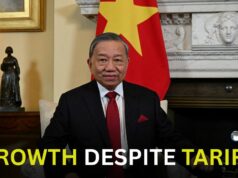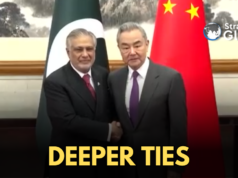In Nepal, a little over two weeks after taking over as prime minister for the fourth time, KP Sharma Oli who belongs to the CPN-UML (Communist Party of Nepal-Unified Marxist Leninist), has kept a low profile vis-a-vis India in contrast to his previous term when the claim to Kalapani was made, triggering an ugly controversy.
Not that he’s given up on the issue. Speaking in the House of Representatives a week after taking over, he said efforts would be made to settle the dispute peacefully.
“The Nepal government has remained committed to settling the border dispute with India through dialogue and diplomacy based on the Treaty of Sugauli, various maps, facts and evidence,” he said. “I would like to make it clear that there would be active efforts in the same way.”
But the sense is Oli is keen to play down his pro-China image in his latest stint as prime minister.
No Loans From China
There’s more. Hours before the CPN-UML and the Nepali Congress (NC) signed the agreement to form the current coalition government, the NC decided not to accept any loans under China’s flagship Belt and Road Initiative (BRI).
“The decision has not been written in a minute, but it is like a minuted decision,” said Prakash Sharan Mahat, NC spokesperson.
The move was aimed at assuring New Delhi and Washington that the new Nepal government under Oli would keep a certain distance from Beijing.
Arun Subedi, former foreign policy advisor to ex-prime minister Sher Bahadur Deuba said, “Because of Oli’s strained relations with New Delhi in the past, the Nepali Congress could play a critical role to bridge the trust deficit between Oli and the Indian establishment.”
When asked whether India or any other country influenced the NC’s decision, Mahat denied it.
A source close to Deuba said the NC had made efforts to take India into confidence about the party’s plans to form a coalition with Oli.
“On behalf of Deuba, I had visited New Delhi in late May and discussed with people in power in India,” the source claimed. “During my conversation with Indian officials, it was clear they were eager to see the return of Deuba as the new prime minister, but it could not happen because of the need to compromise with the UML.”
The source would not disclose whom he met in New Delhi.
Role Of Nepali Congress
Observers say that in the avatar of a coalition partner, Oli is less likely to make moves that would be deemed anti-India.
“Important ministries including foreign affairs and home affairs belong to Nepali Congress,” said Vijay Kant Karna, former Nepali diplomat who heads a Kathmandu-based think tank—Centre for Social Innovation and Foreign Policy.
“The presence of the Nepali Congress in the government and its ministers holding important ministries including foreign ministry could help Oli to bridge relations with New Delhi.”
A source close to Deuba claimed the appointment of Dr. Arzu Rana Deuba, wife of the NC leader, as Nepal foreign minister was made at Oli’s suggestion.
She is known to be close to members of India’s ruling BJP including Vijay Chauthaiwale, who heads the party’s foreign affairs department. Pictures of Dr Arzu tying a rakhi on his wrist was doing the rounds in August 2021, underscoring the sanctity of the brother-sister relationship.
“The NC is clear in its view that any problem with neighbouring countries should be settled through diplomatic means,” Mahat said.
Thinking Within CPN-UML
Since becoming prime minister on July 15, Oli has remained quiet about other aspects of relations with India.
“I believe relations with India will continue to improve under the Oli government too as there is nothing that cannot be resolved through dialogue,” Bishnu Rijal, deputy chief of the foreign affairs department of the CPN (UML) said.
He said India should also realise its own mistake in imposing a trade blockade on Nepal in 2015. “That would be helpful to better relations,” he added.
But India insists the blockade was by Nepal’s own Madhesi population angry over constitutional amendments that ignored their interests and triggered ethnic conflict.
The China Factor
New Delhi would be understandably keen to know more about how the new government sees China, observers said. It’s clear that India is not comfortable with Beijing’s rising profile in an area the former considers its backyard. Delhi has also been taking measures to discourage Chinese investment in Nepal.
For example, India has tried to discourage Chinese investment in Nepal’s hydropower sector. In February 2021, India’s Central Electricity Authority under the Power Ministry, introduced a rule banning the purchase of electricity from a neighbour in a project where China is involved.
Nepali officials say India has refused to supply explosives to a Chinese contractor involved in infrastructure projects in their country. India seems particularly concerned with the BRI Implementation Plan that Nepal and China were preparing to sign. India rejects the BRI because it funds the China-Pakistan Economic Corridor that passes through Kashmir claimed by both India and Pakistan.
In late June, China’s Vice Foreign Minister Sun Weidong visited Nepal to discuss a range of bilateral issues including the signing of the BRI Implementation Plan.
“On June 25, when the BRI implementation was supposed to be signed, I received a lot of calls from those considered to be close to India,” a source close to former prime minister Pushpa Kamal Dahal also known as Prachanda said. “This shows also the concerns India might have about Nepal doing projects under BRI.”
“It was not signed as the Chinese side wanted to study certain issues of the proposed document,” said Rupak Sapkota, former foreign affairs advisor to ex-PM Prachanda. “In fact, the cabinet had given approval, in principle, to sign the BRI Implementation Plan.”
Whether the new government will sign the BRI Implementation Plan is not clear since the NC has vehemently opposed the idea of taking loans under the BRI. Mahat told Stratnewsglobal that his party was against taking loans because Nepal’s public debt had been rising in recent years. Nepal’s debt had reached 42% of GDP The irony is Nepal had signed the framework agreement on BRI in 2017 when Mahat was foreign minister.
But the NC seeking grants rather than loans under BRI is not new. Rather in March 2022, when Chinese Foreign Minister Wang Yi visited Nepal, then Prime Minister Deuba had reportedly urged him to provide grants instead of loans.
China’s ‘debt trap’ diplomacy is another issue and a matter of deep concern in Delhi and Washington. It prompted then PM Prachanda to commit to taking only concessional loans with interest rate comparable with that of the World Bank and the Asian Development Bank.
The Chinese balked at that because it could set a precedent for other countries to demand the same from Beijing.
Could the refusal to accept loans under the BRI cause tensions between the coalition partners?
“If you don’t require loans for Nepal’s development, you have to reject loans from the World Bank, Asian Development Bank, India and other countries too,” said Bishnu Rijal. “Why do you want to reject Chinese loans only? What message would it convey? “
Mahat has the answer. “China has committed a lot of grants over the last several years which have not been realised, we want those grants to be provided in the first phase under BRI,” he said. “We can take loans in the next phase under concessional terms.”
The point is Nepal and China have invested a lot of energy in the BRI Implementation Plan and the former will find it hard to reject the BRI as long as Beijing offers concessional loans.
“It is the question of credibility of not only the leaders but also the nation,” said Rijal.
India A Priority
While the BRI for now remains in limbo, it would seem improving relations with India is a priority for Prime Minister Oli, more so given the past history of confrontation.
Under Prachanda, Nepal and India chalked up some achievements in bilateral economic relations. When Prachanda visited New Delhi in May-June last year, he signed a long-term power trade agreement ensuring that Nepal could export in excess of 10,000MW in 10 years.
Prachanda saw this as a major achievement since Nepal needs to export surplus power during the monsoon. He also visited China in September and committed to the ‘One China’ principle instead of the long-held position ‘One China Policy.”
“The Prachanda-led government succeeded in maintaining balanced relations with both India and China,” claimed Rupak Sapkota, former foreign policy adviser to ex-prime minister Prachanda, while acknowledging that the current coalition government would not be to Beijing’s liking.
“It is a well-known fact that China’s wish is for Nepal’s communist forces be united,” he said.
But Nepal has a history of communist forces forging alliances with the NC. Not long ago, the CPN (Maoist Centre) led by Prachanda was running a coalition government with the NC.
Sapkota believes that despite Oli’s history of confrontation with India, he will be careful not to cross Delhi’s red lines. “In my view, Oli will not confront China but he will try to befriend India.”
Prithvi Shrestha is Executive Editor, Arthik Abhiyan Daily




